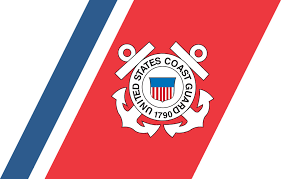When the Baton Rouge gauge reads above 35′, a U.S. Coast Guard Vessel Traffic Service (VTS) Measure is established in accordance with the Navigation Safety Regulations, Code of Federal Regulations Title 33, Subpart 161.11, for all waters of the Lower Mississippi River (LMR) from Mile 167.5 Above Head of Passes (AHP), to Mile 234 AHP. This VTS Measure is needed to protect persons and vessels from the potential safety hazards associated with the effects of high water levels on the Lower Mississippi River. This Measure is effective at 6:00 A.M. on Saturday, March 27, 2021 with the following provisions:
Port Allen Lock LMR (MM 219-229):
- All tows >650′ (including towboat) are required to employ an assist vessel of at least 1200 HP when entering or exiting the locks.
- All tows exiting Port Allen Lock into the LMR intending to tum northbound shall use an assist vessel of at least 1200 HP or proceed southbound below MM 221 if topping around unassisted before heading north.
- Approval must be granted by VTS prior to exiting Port Allen Lock and turning northbound.
- All tows are required to have 280 HP per standard loaded barge on canal tows entering/exiting the Locks. Empty barges may be calculated at ½ the horsepower requirements to that of a loaded barge when computing the overall horsepower requirement. Towing vessels with Z-drive propulsion type may be treated as having a horsepower 20% greater than its engine’s rating for the purpose of this calculation.
- VTS has authority to grant exceptions to these requirements up to 400 HP based on conditions and the size of the tow.
Tows Topping Around between Duncan Point and the HWY 190 Bridge including Harbor Fleet Tows (MM 221 -234):
- Tows less than 300 feet in length shall use a minimum 800 HP assist vessel when topping around.
- Tows greater than 300 feet in length but less than 600 feet shall use a minimum 1000 HP assist vessel when topping around.
- Tows greater than 600 feet in length shall use a minimum 1800 HP assist vessel when topping around.
Ocean Going Vessel requirements, Baton Rouge Harbor (MM 225-234):
- Ocean going vessels must use tug escorts with adequate horsepower alongside while transiting above the 1-10 Bridge to the dock, as well as departing the dock and transiting downbound past the 1-10 Bridge.
- Only one ocean going vessel at a time will be allowed to be underway between the 1-10 Bridge and the US-190 Bridge.
- Ocean going vessels shall not anchor in the upper half mile of the Baton Rouge General Anchorage. The Pilot must notify VTS if it is necessary to anchor any vessel in the remainder of the anchorage.
- Ocean going vessels must contact VTS Baton Rouge Watch on VHF FM Ch. 12 with ETA to Richard Powell Range light (MM 218.4) and check in again at MM 219.
- Ocean going vessels departing this area must contact VTS prior to getting underway.
Dangerous Eddies: 81-Mile Point. Bringier Point. & Plaquemine Point:
- Vessels are prohibited from holding up within ¾ of a mile of 81 Mile Point on the LDB.
- All tows should stay 300-400 feet off the left descending bank within ½ mile of 81-mile point (MM 178-179) to avoid dangerous eddies.
- Mariners are advised to proceed with caution in the vicinity of Bringier Point (MM 172-173) and Plaquemine Point (MM 206-208) where dangerous eddies have been previously reported.
- Although the above locations have had eddies specifically reported, mariners are advised to be continuously on the lookout for irregular currents which may pose a threat to navigation throughout the LMR.
This Marine Safety Information Bulletin supersedes Volume XXI, Issue 010 High Water Safety Advisory: MM 219 to MM 240 AHP LMR Above 30′ and Issue 012 High Water Safety Advisory: MM 219 to MM 229 AHP LMR Above 33′.
For additional information, contact the following:
Vessel Traffic Center Lower Mississippi River: (504) 365-2512 (24 HR), VHF-FM ch 05A, 11, or 12
Coast Guard Baton Rouge Waterways Management: (225) 298-5400 X230
Coast Guard Sector New Orleans Command Center: (504) 365-2200


